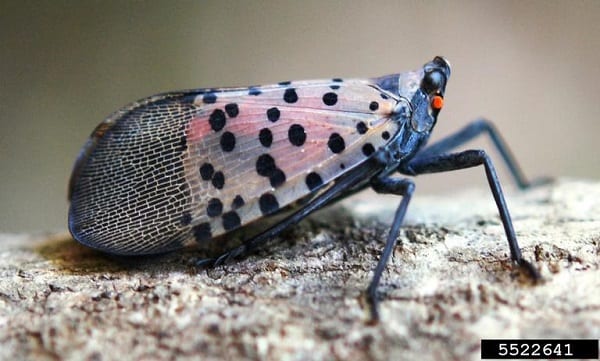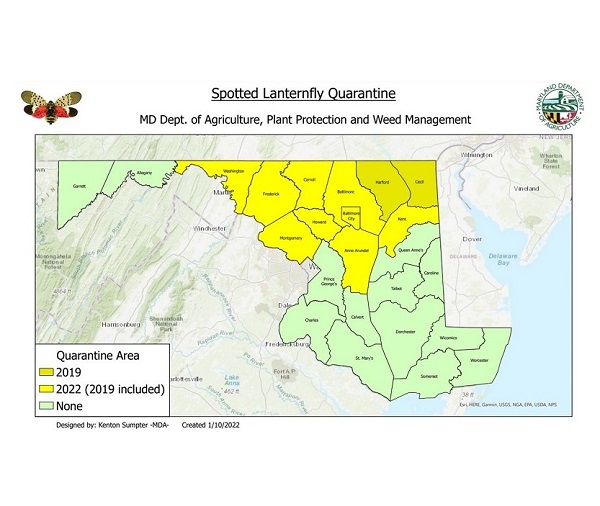ANNAPOLIS, MD—The Maryland Department of Agriculture on Friday expanded its spotted lanternfly quarantine to include the following counties: Anne Arundel, Baltimore, Carroll, Cecil, Frederick, Harford, Howard, Kent, Montgomery, and Washington, as well as Baltimore City.
This quarantine is effective immediately, and restricts the movement of regulated articles that might contain the spotted lanternfly in any of its life stages, including egg masses, nymphs, and adults.
“While they are not known to pose any serious human or animal health concern, the spotted lanternfly is a destructive invasive species that has negatively impacted agriculture operations throughout the mid-Atlantic region,” said Secretary Joe Bartenfelder. “MDA has taken steps to expand the quarantine zone out of an abundance of caution as we remain vigilant in controlling the spread of this destructive insect.”
The original quarantine order from 2019 included Cecil and Harford counties, which have established spotted lanternfly populations. The invasive species was first spotted in Maryland in July 2019. The quarantine zone has now been expanded to nine additional jurisdictions based on the confirmed existence of known spotted lanternfly populations in these areas. A map of the new quarantine zone can be viewed online here.
Businesses, municipalities, and government agencies that require the movement of any regulated item within or from the quarantine zone must have a specialized permit. A permit can be obtained by taking a free online training course through PennState Extension. Upon completion of the course and an online exam, individuals will receive a permit. Examples of regulated articles include landscaping, remodeling, or construction waste; packing materials like wood boxes or crates; plants and plant parts; vehicles; and other outdoor items.
Managers, supervisors, or employees of a business or organization operating in the quarantine zone must receive the approved training and pass the exam to demonstrate a working knowledge and understanding of the pest and quarantine requirements. Training of other employees, inspection of vehicles and products, and removal of living stages of spotted lanternfly must also be completed.
All spotted lanternfly permits for Virginia, Pennsylvania, New Jersey, and Delaware are transferable and valid throughout the region — meaning a permit from any of these states can be used in Maryland.
The spotted lanternfly poses a major threat to the region’s agricultural industries as it feeds on over 70 different types of crops and plants, including grapes, hops, apples, peaches, oak, pine, and many others. Originally from Asia, the spotted lanternfly is not native to the U.S., and was first detected in Berks County, Pennsylvania in fall 2014. As a known hitchhiker, the spotted lanternfly has spread to Connecticut, Delaware, Indiana, New Jersey, New York, Ohio, Virginia, and West Virginia, as well.
Those living within the quarantine zone are encouraged to be vigilant in containing the spread of spotted lanternfly. Residents can report sightings through MDA’s online survey. Other informational materials are available on the program’s website here.

Do you value local journalism? Support NottinghamMD.com today.

